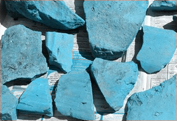
In 2004 the Society looked at a number of sites on the route of the Roman Road from Wigan to Manchester. Of particular interest was Cleworth Hall which is situated right on the eastern edge of the borough in Tyldesley (see Newsletters 71 & 72). It presents a field which appears to have been untouched over the years and therefore has the potential for the road to have survived. Sibson names the field as 'Rough Field' and suggests the name itself comes from the fact that it had not been cultivated in the past. He goes on to describe the road as "..being covered with a thick and broad coat of Blue Shale; which has become a belt of Blue Clay, about a foot in thickness, and twelve yards in breadth...". There is nothing visible on the surface now to indicate that there was ever a road here but the field itself looks ideal for a resistivity survey. In the next week or so we are hoping to arrange a site visit and hopefully get permission to continue our investigations. This is not to say we are halting our other projects. The Rectory, which has been on hold over the winter months, will be revived in the coming weeks. As we have all but finished Area1 we are hoping to move onto the next area which is beyond the trees on the right-hand side of the entrance. We also need to prepare the site for a visit by the students from Winstanley College who have shown a particular interest in our project. We also have the Belle Vue Farm survey to continue and the Road Signs survey which we mentioned last year - so something for everyone to get involved with.
Centre for North-West Regional Studies
This organisation is having its 38th Annual Archaeological Forum on Saturday 5th March. It is to be held, as usual, in the Faraday Lecture Theatre at Lancaster University. It will consist of a full day of lectures on a variety of subjects ranging from the prehistoric to the industrial revolution. There will be three papers on the Roman period including one on Baths and bathing in Roman Chester. If you are interested in attending you can download a booking form from their website at www.lancs.ac.uk/users/cnwrs/events.html or contact me at our next meeting.
On Saturday 2nd April the Centre will also be hosting a Study Day with the Medieval Settlement Research Group. It will be held in the same venue and will include a series of lectures on various aspects of Medieval settlement from the Viking-age to the late Medieval period. Once again if you are interested in attending you can get more details and a booking form from the above website - or see me at our next meeting.
Puddletown Forest
Talking about Roman roads, what do you think about this one (see below). It was found in Dorset recently by the Forestry Commission when they were clearing away their pine trees. It consists of a huge bank, 4.5m high and 25m wide, with deep ditches on either side. It stretches for half a mile and was part of the road that ran from London to Exeter. Peter Addison from English Heritage says it might have been built shortly after the Roman conquest and, therefore, on a scale designed to intimidate the locals. It was part of the road that goes from Badbury Rings to the fort at Dorchester and part of the network of roads from Old Sarum (now Salisbury) to Exeter. Its construction reveals a central cobbled 'street', which would have been used for rapid troop movements, and outer 'droving' roads for livestock. Peter points out that the fact it still exists is testimony to the skills of the builders.
Next Meeting
Wednesday 2nd March in the Concert Room of the Upper Morris Street Working Men's Club (off Greenough Street), starting at 7.30 pm as usual. At the end of last year we reported problems with our venue (December's meeting was held in the small dining room). However the situation has now been resolved and we can confirm that the Concert Room will be our venue for the foreseeable future. This is great news; particularly as this month we have the eminent speaker, John Edwards from Liverpool, who will be giving us a talk on Lord Leverhulme (and his creation - Port Sunlight). John is employed by Liverpool Council to give guided tours around the Port Sunlight site and therefore he does know everything there is to know about it. Lord Levehulme is also famous, of course, for his pleasure gardens, bungalow and castle folly at Rivington near Horwich and John will hopefully be covering this aspect on a subsequent visit. In the mean time his visit this month promises one not to be missed.
Hope to see you there. - BA
|



